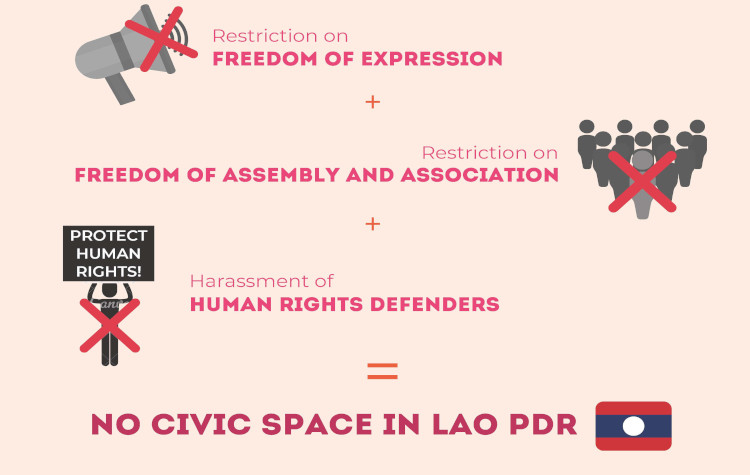 5 August 2019, Bangkok – Manushya Foundation, CIVICUS and the Asian Forum for Human Rights and Development (FORUM-ASIA) call on the Government of Lao PDR to remove all unwarranted restrictions on civic space in the country ahead of its human rights review to be held at the United Nations (UN) in January-February 2020. The review will mark five years since UN member states made 33 recommendations to the Lao government that directly relate to barriers to open civic space. As of today, the government has partially implemented only three recommendations.
5 August 2019, Bangkok – Manushya Foundation, CIVICUS and the Asian Forum for Human Rights and Development (FORUM-ASIA) call on the Government of Lao PDR to remove all unwarranted restrictions on civic space in the country ahead of its human rights review to be held at the United Nations (UN) in January-February 2020. The review will mark five years since UN member states made 33 recommendations to the Lao government that directly relate to barriers to open civic space. As of today, the government has partially implemented only three recommendations.
Following its last review in 2015 , the government of Lao PDR committed to reassess the policy framework and restrictions on domestic and international civil society organisations and facilitate an enabling environment for them; to fully respect and ensure freedom of expression by revising legislation; to ensure freedom of assembly in accordance with the International Covenant on Civil and Political Rights (ICCPR); and to investigate individual cases such as the enforced disappearance of Sombath Somphone.
In a joint submission to the third Universal Periodic Review (UPR) of Lao PDR, our organisations assess the current human rights situation to track compliance with these recommendations and international human rights standards. The submission finds that Lao PDR’s persistent failure to uphold its commitments has resulted in continued unwarranted restrictions to civic space and acute shortcomings with respect to the right to freedom expression, assembly and association, and in the protection of human rights defenders.
“Using unwarranted defamation, libel, and slander charges, justified by vague claims of ‘national interests’, the government increasingly restricts any speech or actions that would highlight corruption or the violation of rights resulting from development projects and investments, specifically those related to land and sustainable development.” said Emilie Pradichit, Founder & Director of Manushya Foundation. “The Lao government must immediately repeal or amend legislations that do not comply with international standards and obligations through transparent and inclusive mechanisms of public consultation, end the harassment and intimidation against persons who speak up, and provide effective remedy in cases where the rights of individuals have been denied or violated.”
Manushya, CIVICUS and FORUM-ASIA are seriously concerned about the pervasive control exercised by the government over civil society, and the severe restrictions faced as a result. Extensive surveillance, reprisals and the criminalisation and enforced disappearance of human rights defenders have created an environment in which it is all but impossible to speak out. The right to freedom of expression, peaceful assembly and association are guaranteed in the Constitution of Lao PDR, and its obligations under the ICPPR. However, the legal framework – including broadly formulated, restrictive and conflicting provisions in the Constitution, the Penal Code, and other laws, as well as government decrees passed without oversight – serves to limit any independent action or information, and criminalise any expression perceived as critical of the government. All actions taken and information shared must undergo a lengthy process of state approval and organisations are forced to maintain close ties with the State, making independent human rights organisations virtually non-existent.
“The laws, policies and practices of the Lao government restrict any legitimate activities that they believe could threaten the state. Constant monitoring and the detention of activists such as Bounthanh Thammavong, Lodkham Thammavong, Soukane Chaithad, Somphone Phimmasone, and the enforced disappearance of Sombath Somphone, has compounded this chilling effect to the extent that activists and journalists now avoid using ‘human rights’ language in their work,” said Josef Benedict, Civic Space Researcher at CIVICUS. “States must question these actions of the Lao government that allow for impunity for violations of civic freedoms and press the government to create a safe, respectful and enabling environment that is free of undue hindrances, obstruction, legal or administrative harassment.”
Manushya, CIVICUS and FORUM-ASIA also urge the member states of the United Nations (UN) to use the UPR of Lao PDR to ensure increased transparency and accountability through law and practice in order to protect and promote the rights of civil society in Lao PDR, especially those of human rights defenders, civil society activists, and journalists.
“The Universal Periodic Review of Lao PDR is an important opportunity to hold the Lao government accountable for ongoing, serious violations of fundamental freedoms and human rights,” concluded Ahmed Adam of FORUM-ASIA. “The international community cannot afford to ignore the permanent closure of civic space and criminalisation of legitimate exercise of freedom of expression, peaceful assembly as well as work of human rights defenders in Lao PDR. International scrutiny is necessary to improve the human rights situation in Lao PDR, particularly given that the government has done nothing to change a situation that has been ongoing for decades.”
**
For a PDF version of this statement, please click here.
To download the complete joint submission, please click here.



